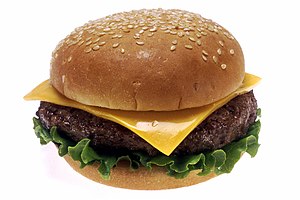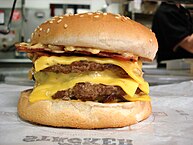Cheeseburger
 Cheeseburger | |
| Course | Main course |
|---|---|
| Place of origin | United States |
| Serving temperature | Hot |
| Main ingredients | Ground beef patty, cheese and bread buns |
| 600-1500 kcal (-5680 kJ) | |
A cheeseburger is a hamburger topped with cheese. Traditionally, the slice of cheese is placed on top of the meat patty, but the burger can include many variations in structure, ingredients, and composition. The cheese is normally added to the cooking hamburger patty shortly before the patty is entirely cooked, which allows the cheese to melt. As with other hamburgers, a cheeseburger may include toppings, such as lettuce, tomato, onion, pickles, mustard, mayonnaise, ketchup, or bacon.
In fast food restaurants, the cheese used is normally processed cheese, but other cheeses may be used instead, such as cheddar, Swiss, mozzarella, blue cheese, and pepper jack.
History
Adding cheese to hamburgers became popular in the late-1920s to mid-1930s, and there are several competing claims as to who created the first cheeseburger. Lionel Sternberger is reputed to have introduced the cheeseburger in 1926 at the age of 16 when he was working as a fry cook at his father's Pasadena, California sandwich shop, "The Rite Spot", and "experimentally dropped a slab of American cheese on a sizzling hamburger."[1][2][3][4][5]
An early example of the cheeseburger appearing on a menu is a 1928 menu for the Los Angeles restaurant O'Dell's which listed a cheeseburger smothered with chili for 25 cents.[6][7]
Other restaurants also claim to have invented the cheeseburger. For example, Kaelin's Restaurant in Louisville, Kentucky, said it invented the cheeseburger in 1934.[8] One year later, a trademark for the name "cheeseburger" was awarded to Louis Ballast of the Humpty Dumpty Drive-In in Denver, Colorado.[9] According to Steak 'n Shake archives, the restaurant's founder, Gus Belt, applied for a trademark on the word in the 1930s.[10][11][12]
Currently, the most expensive cheeseburger in America belongs to New York City food truck 666 Burger. It's a $666 burger that is wrapped in gold leaf and topped with lobster, caviar, truffles, foie gras, and aged gruyere cheese melted with steam from champagne poured on the hot griddle.[13]
The largest cheeseburger ever made in the world weighed 2,014 pounds (914 kg), "60 pounds [27 kg] of bacon, 50 pounds [22.5 kg] of lettuce, 50 pounds [22.5 kg] of sliced onions, 40 pounds [18 kg] of pickles, and 40 pounds [18 kg] of cheese." The record was broken by Minnesota's Black Bear Casino breaking the previous Cheeseburger record 881 pounds (400 kg).[14]
Variations
Ingredients
The ingredients used to create cheeseburgers follow similar patterns found in the regional variations of hamburgers. Popular regional toppings include bacon, avocado or guacamole, sliced sautéed mushrooms or onions, cheese sauce and/or chili. Less common ingredients include egg, feta cheese, salsa, jalapeños, and other kinds of chili peppers, anchovies, slices of ham, mustard, gyros meat, or bologna, horseradish, sauerkraut, pastrami or teriyaki-seasoned beef, tartar sauce, french fries, onion rings, potato chips, a pat of butter, pineapple, and tofu.
A cheeseburger may have more than one hamburger patty and more than one slice of cheese. A stack of two patties is called a double cheeseburger; a triple cheeseburger has three, and a quadruple has four.[15][16] Some cheeseburgers are prepared with the cheese enclosed within the ground beef, rather than on top. This is sometimes known as a Jucy Lucy.
Religious
Traditionally, this dish breaches the kosher laws (Hebrew: כַּשְׁרוּת; kashrut) observed by Judaism as it combines ground beef and cheese. Mixtures of milk and meat (Hebrew: בשר בחלב, basar bechalav, literally "meat in milk") are prohibited according to Jewish religious law (Hebrew: הלכה; halakha), following a verse in the Book of Exodus in which Jews are forbidden from "boiling a (kid) goat in its mother's milk".[17][18] This prohibition appears again in Deuteronomy.[19] This dietary law sparked controversy in Jerusalem when McDonald's began opening franchises there that sold cheeseburgers.[20] Since that time, McDonald's has opened both kosher and non-kosher restaurants in Israel.[21]
In an attempt to provide a "kosher cheeseburger", a kosher restaurant in New York City created a controversial cheeseburger variation which replaces cheese with soy cheese.[22]
Gallery
-
A cheeseburger with mushroom sauce and fries
-
A Burger King "Quad Stacker" cheeseburger, containing four patties and bacon
-
Smaller versions of cheeseburgers served with jalapeños, fries, coleslaw, and chili sauce
-
A cheddar-stuffed cheeseburger
See also
References
- ^ "Lionel Clark Sternberg obituary". Time. 7 February 1964. Retrieved 18 May 2007.
…at the hungry age of 16, [Sternberger] experimentally dropped a slice of American cheese on a sizzling hamburger while helping out at his father's sandwich shop in Pasadena, thereby inventing the cheeseburger…
{{cite news}}: Unknown parameter|subscription=ignored (|url-access=suggested) (help) - ^ Harvey, Steve (27 March 1991). "Only in L.A." Los Angeles Times. p. B2.
Cooking at his father's short-order joint in Pasadena in the early 1920s, [Sternberger] experimentally tossed a slice (variety unknown) on a hamburger...
- ^ Perry, Charles (9 June 2004). "It's an L.A. Thing; Our burgers are the best with good reason: We made them here first". Los Angeles Times. p. F1.
- ^ Piasecki, Joe (13 January 2012). "Yes, it was invented in Pasadena! Probably. Tracing the cheeseburger from inception to Bob's Big Boy". Pasadena Sun. Retrieved 13 May 2012.
- ^ Henerson, Evan (23 June 1999). "The Tale of the Cheeseburger". San Gabriel Valley Tribune. Archived from the original on 12 April 2003. Retrieved 13 May 2012.
{{cite news}}: Unknown parameter|dead-url=ignored (|url-status=suggested) (help) - ^ Grace, Roger M. (15 January 2004). "Old Menus Tell the History of Hamburgers in L.A." Metropolitan News-Enterprise. Retrieved 13 May 2012.
- ^ Spiers, Katherine (18 September 2013). "Were Cheeseburgers Invented in Pasadena?". KCET. Retrieved 8 December 2014.
- ^ "Louisville Facts & Firsts - LouisvilleKy.gov". City of Louisville, Kentucky. Archived from the original on 6 October 2014. Retrieved 29 July 2006.
{{cite web}}: Unknown parameter|deadurl=ignored (|url-status=suggested) (help) - ^ "History of the Cheeseburger". Cheese-Burger.net. Retrieved 2 October 2008.
- ^ Flick, Bill. "Flick Fact 2/20/2012 Monday". Bloomington Pantagraph. Retrieved 21 February 2012.
- ^ "Our 'Top 5 List' of little-known facts about Bloomington-Normal". Archived from the original on 2 December 2011. Retrieved 21 February 2012.
- ^ Perry, Catherine D. (7 July 2004). "Steak 'n Shake vs Burger King, Memorandum and Order" (PDF). United States District Court Eastern District Missouri Eastern Division. Archived from the original (PDF) on 28 September 2013. Retrieved 21 February 2012.
{{cite web}}: Unknown parameter|deadurl=ignored (|url-status=suggested) (help) (July 7, 2004) 323 F. Supp.2d 983 (E.D. Mo. 2004) - ^ "8 Fantastic Facts to Celebrate National Cheeseburger Day". 18 September 2013. Retrieved 2 March 2017.
- ^ "World's Biggest Cheeseburger Clocks in at 2,014 Pounds". 4 September 2012. Retrieved 2 March 2017.
- ^ Tice, Carol (28 January 2002). "In-N-Out Burgers: With an emphasis on quality, this fast feeder shows its rare appeal. (Regional Powerhouse Chains)". Nation's Restaurant News – via Highbeam Research.
{{cite news}}: Unknown parameter|subscription=ignored (|url-access=suggested) (help) - ^ Hall, David (24 October 2006). "Society's fast food intake reeks". Daily Skiff. DailySkiff.com. Retrieved 13 February 2010.[dead link]
- ^ Exodus 34:26
- ^ Exodus 23:19
- ^ Deuteronomy 14:21
- ^ Bronner, Ethan (3 September 1995). "Big Mac under attack in Jerusalem As McDonald's rings up sales of nonkosher burgers, outcry on 'cultural identity' heard". Boston Globe. bostonglobe.com. Retrieved 21 August 2010 – via ProQuest.
{{cite news}}: Unknown parameter|subscription=ignored (|url-access=suggested) (help) - ^ "Will residents of Jerusalem get to bite a kosher Big Mac?". J. the Jewish News Weekly of Northern California Magazine. jweekly.com. 21 December 2001. Retrieved 21 August 2010.
- ^ Montefinise, Angela (2 March 2008). "Jews Have A 'Beef'". New York Post. nypost.com. Retrieved 30 May 2014.
Further reading
- Henerson, Evan (23 June 1999). "The Tale of the Cheeseburger". San Gabriel Valley Tribune. Archived from the original on 12 April 2003.
{{cite web}}: Unknown parameter|dead-url=ignored (|url-status=suggested) (help)





